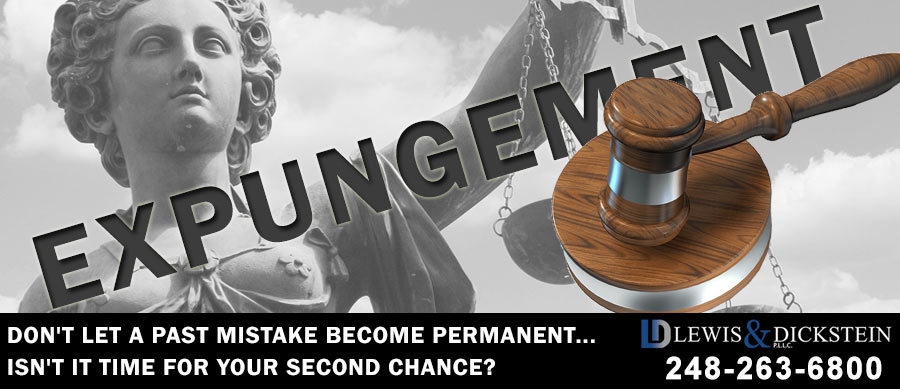Expungement Frequently Asked Questions
A person should not be defined by a negative moment in their past. Expungement clears your criminal history and removes the burdens of one or more prior contacts with the criminal justice system.

Frequently Asked Questions about Expungement
How can I get my record expunged for free?
If you are eligible, the only way to get a free expungement is to wait for an automatic expungement (you can apply for an early expungement, but not without a fee). Up to two (2) felony convictions could be automatically expunged 10 years after sentencing or the person’s release from custody, whichever is later. As many as four (4) misdemeanors can be automatically expunged after seven (7) years from sentencing. The following convictions are ineligible for automatic expungement:
- assaultive convictions,
- serious misdemeanor,
- offenses punishable by more than 10 years imprisonment,
- convictions that involve a minor, a vulnerable adult, or injury or death of a person,
- human trafficking convictions,
- life offenses,
- alcohol-related driving convictions (like DUI, OWI, etc.),
- traffic offenses related to a CDL,
- criminal sexual conduct, and
- any conviction that cannot be expunged under MCL 780.621c.
How do I get a record expunged?
In Michigan, expungement is also referred to as “setting aside a conviction” or “expungement of a criminal record.” The process for expungement in Michigan involves several steps, which are as follows:
- Determine eligibility: Before starting the expungement process, it’s essential to determine if you are eligible. You may qualify for expungement if you meet specific criteria, including the following:
- You have not been convicted of more than three felony offenses.
- The offense you want to expunge is eligible for expungement under Michigan law.
- You cannot seek to set aside convictions for certain offenses, such as traffic offenses resulting in injury or death, certain felonies (such as criminal sexual conduct and life offenses), or certain misdemeanors (such as OWI 2nd offense or offenses involving a commercial motor vehicle license)
- You have completed all the terms of your sentence, including probation, parole, or any other conditions imposed by the court.
- You have not been convicted of any new offenses in the past three (3) to seven (7) years, depending on the conviction offense you’re seeking to set aside, and
- You must not have any pending charges.
- Obtain court records: You must obtain a certified copy of your criminal conviction from the court where you were convicted. You can get this by contacting the court clerk’s office.
- Obtain Fingerprints: You must obtain an official set of fingerprints to send with your application. You can do this by contacting your local law enforcement agency and asking to be printed on a Michigan Applicant Fingerprint Card.
- File a petition for expungement (otherwise known as an Application to Set Aside Conviction(s)): Once you have determined your eligibility, obtained your court records, and obtained your fingerprint card, you must file a Petition for Expungement with the court. The applicant must sign the application before a Notary Public before filing. The petition must include information about the offense you want to set aside, the date of the offense, and the sentence you received. An experienced attorney knows best what documents to submit with the application and how to make the appropriate arguments in a supporting memorandum.
- Serve notice on the prosecutor: After filing the petition, you must serve notice on the prosecutor who handled your case and the Michigan Attorney General.
- Schedule a hearing with the assigned judge.
- Attend a hearing: At the hearing, you must explain why you should be granted an expungement and prove why it is in the community’s best interest.
- Wait for the court’s decision: After the hearing, the judge will decide whether to grant your request for expungement. If the court grants your request, the Michigan State Police will remove the conviction from your public record.
- Wait three (3) years to try again if you lose: If the judge denies your application, you cannot make a new request for three (3) years (a skilled Michigan expungement attorney is your best hope of success!)
The expungement process is complicated. It is helpful to seek the assistance of an experienced attorney to guide you through the process. One small mistake can lead to a denial, leaving you unable to make a new request for an additional three (3) years.
Do expunged records show up on fingerprinting?
When a record is expunged, it is removed from public access and generally becomes invisible to most employers, landlords, and members of the public. However, certain entities, such as law enforcement agencies, courts, and government bodies conducting fingerprint-based background checks, may still access expunged records. Similarly, employers and agencies involved in sensitive areas like law enforcement or national security might review expunged records during thorough background checks. The accessibility of expunged information depends on the laws governing expungement and the specific purpose of the background check, making it essential to understand the complexities of these regulations.

What crimes are expungable?
Most Michigan felony and misdemeanor convictions are eligible for expungement. Common offenses eligible for expungement include:
- Domestic Violence,
- Assault and Battery,
- Felonious Assault,
- Home Invasion,
- Breaking and Entering,
- OWI First Offense,
- Driving on a Suspended License,
- Retail Fraud (shoplifting)
- Larceny,
- White-Collar Offenses, and
- Malicious Destruction of Property.
There are thousands of expungable offenses. However, Judges cannot set aside some criminal convictions. For example, the following convictions are not eligible for expungement:
- Offenses with a maximum sentence of life in prison,
- Criminal Sexual Conduct,
- Traffic offenses resulting in serious injury or death,
- OWI 2nd or subsequent offense, and others.
Can a DUI be expunged?
In Michigan, a DUI is called Operating While Intoxicated (OWI). A first-offense OWI is eligible for expungement (or a similar first-offense alcohol or drug-related driving conviction). The petitioner must:
- wait five (5) years from completing probation or jail,
- have no pending charges,
- prove they’ve been rehabilitated,
- show they took advantage of substance abuse counseling, therapy, or education, and
- prove that setting aside the conviction is in the community’s best interest.
How to get an OWI expunged?
The process for first-offense OWI expungement is generally the same as that for other misdemeanor offenses. The main difference between OWI expungement and simple misdemeanor expungement is that the waiting period increases to five (5) years. The petitioner must prove they took advantage of substance abuse therapy, education, and counseling.

Who can see expunged records?
Generally, only law enforcement and court employees can see expunged records.
How to get a misdemeanor expunged?
The process for misdemeanor expungement is the same as setting aside a felony conviction; however, the waiting period is reduced to three (3) years for simple misdemeanors. Serious misdemeanors require a five (5) year waiting period. Serious misdemeanors include offenses such as:
- assault and battery
- domestic violence
- assault; infliction of serious injury
- aggravated domestic violence
- breaking and entering or illegal entry
- child abuse in the fourth degree
- contributing to the neglect or delinquency of a minor
- using the internet or a computer to make a prohibited communication
- intentionally aiming a firearm without malice
- discharge of a firearm intentionally aimed at a person.
- discharge of an intentionally aimed firearm resulting in injury
- indecent exposure
- stalking
- injuring a worker in a work zone
- leaving the scene of a personal injury accident
- operating a vehicle while under the influence of or impaired by intoxicating liquor if the violation involves an accident resulting in damage to another individual’s property or physical injury or death to another individual
How long does expungement take?
A lawyer can expedite the expungement process. A great lawyer will ask for letters of community support and various documents to submit for the judge’s consideration. As long as you get any requested documents to your attorney promptly, they should be able to file for the expungement within weeks. It can take weeks or months for the Michigan State Police and Michigan Attorney General to respond to a motion. In all, an expungement that proceeds smoothly can take around three months.

How much does it cost to get your record expunged?
There are associated costs for filing a Motion to Set Aside a Conviction, such as the cost to obtain fingerprints, $50.00 for the Michigan State Police to analyze your fingerprints, court filing fees, and the cost to get a certified copy of your conviction. In all, the costs should not exceed $250.00. It would be best to consider the cost of hiring an expungement lawyer. Attorneys charge legal fees commensurate with their training, specialization, track record, and reputation. Hiring a great lawyer to maximize your odds of success will run between $3,500.00 and $10,000.00, depending on the complexity of your situation and other factors. Every case is different, and it is best to contact an attorney for a free consultation to learn more.
Can immigration look at your expunged record?
In general, U.S. immigration officials may still be able to see expunged convictions, even if the records are not visible to most employers, landlords, or other members of the public.
When someone applies for an immigration visa, green card, or citizenship, they are required to disclose their entire criminal history, including any expunged convictions. Failure to disclose a prior conviction, including an expunged conviction, could lead to a denial of their application or even deportation if they are already in the United States.
In addition, U.S. immigration officials may have access to certain criminal records databases that are not accessible to the general public. Even if a conviction is expunged from public records, it may still be accessible to immigration officials.
Do expunged records show up on background checks?
An expunged conviction will not appear on a background check based on public criminal history databases. An expunged conviction might show up depending on the breadth of a background check and the resources utilized. For example, some background check companies maintain private databases that are not cross-checked to remove expunged records. After a completed expungement, you can hire a company specializing in updating private background databases and request the removal of deleted records.
Does a probation violation prevent expungement?
Probation violations do not prevent expungement but can complicate the process. Technically, a Michigan judge must look at a defendant’s post-conviction behavior when deciding if they’ve been rehabilitated. Because probation violations follow a conviction, a judge can consider them when deciding whether to set aside a conviction. Being upfront and acknowledging a probation violation is essential before the prosecutor or attorney general raises the issue before the judge at the expungement hearing.
Can I own a gun after expungement in Michigan?
Suppose you obtain a pardon or the expungement of your felony conviction. In that case, you can legally own firearms under Michigan law because it’s as if your conviction never occurred in the first place. In other words, you cannot be convicted of being a Felon in Possession of a Firearm in a state court. Most firearms must be registered to possess a firearm or get a CPL lawfully. The FBI will not recognize some expungements. If the FBI does not acknowledge someone’s expungement, they cannot register a firearm or obtain a CPL. You can appeal an FBI denial based on an expunged conviction or seek relief through a federal lawsuit in a United States District Court.
What is the Michigan Clean Slate Law?
Michigan’s Clean Slate Laws are various recent amendments to Michigan’s expungement statute. The Clean Slate Law vastly increases the number of felony and misdemeanor offenses eligible for expungement, reduces the waiting period before someone can file a motion, permits the expungement of up to three (3) felony convictions and an unlimited number of misdemeanors, and more.
What is the “one bad night rule” in Michigan?
Multiple felony or misdemeanor convictions must be treated as one felony or one misdemeanor conviction if they occurred within 24 hours and arose from the same event.

Top Expungement Attorneys – We can help you!
At LEWIS & DICKSTEIN, P.L.L.C., we understand that your past mistakes don’t define who you are today, and we are here to help you take control of your future. Clearing your criminal record can open doors to better job opportunities, restore your reputation, and give you the fresh start you deserve. Our team of highly experienced, effective attorneys has a proven track record of success in helping clients just like you navigate Michigan’s expungement process with confidence. We relentlessly pursue the best possible outcome for every client, leveraging our expertise, reputation, and dedication to achieve life-changing results. Don’t let your past hold you back any longer—contact us today for a free consultation, and let us fight to give you the second chance you’ve earned. Your future starts here, and we’ll be with you every step of the way.
Call us today at (248) 263-6800 for a free consultation or complete an online Request for Assistance Form. We will contact you promptly and find a way to help you.








